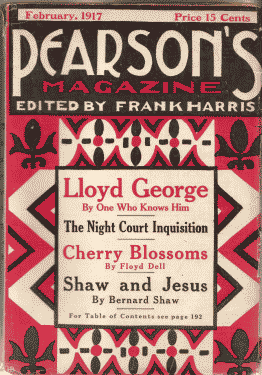(More Journalism).
Frank Harris was the editor of Pearson's Magazine from October 1916 through to September 1922. From October 1922 to April 1925 he was contributing editor.
(Thus far, I have only read 4 issues of Pearson's from Harris' early days as editor, so this assessment is provisional. I suspect that as time went on his interest flagged as it usually would, so later issues are probably of a more erratic quality).
Pearson's Magazine, when Harris took it over, was - I understand - a fairly conservative, dull affair with falling circulation and advertising. Harris turned it into a radical anti-war paper with new writers and a growing readership. He wrote much of it himself, some under pseudonyms so as not to seem to dominate it.
Coincidentally, there was an English magazine of the same name published at the same time. (I know this as I bought a bound volume of the wrong one by mistake - don't fall into the same error!) It is instructive to compare the two as it shows just how extraordinary Harris' work was. The English Pearson's is quaint, comfortable, patriotic, unquestioning in its assumptions and thoroughly middle-class. The American one is an altogether wilder beast, full of the same contradictions as its editor. Harris places his reminiscences of Edward VII - material that would turn up later in My Life and Loves - alongside impassioned pleas for justice and fair wages for the working man.
The Night Court
What in particular stands out for me is Harris' series of articles about the New York Night Court, an example of investigative journalism at its most personal and affecting. Harris showed how moral delinquency and cynicism infected the system, with corrupt cops entrapping the innocent and guilty alike. One case will stand for all: a Mrs Silver, previously of good character, was accused of prostitution and remanded in custody with bail set at the outrageous sum of $500. While in prison she miscarried and became ill. Despite this her husband was forbidden to see her until her trial where she was found guilty entirely on the word of a police informant and an officer. Her health weakened further and she eventually died.
In reporting this and similar outrages, Harris' indignation somewhat impaired his logic, or at least the enunciation of it:-
The explanation is that individual liberty so-called, or individualism, is pushed to an extremity in these United States that it has resulted practically in anarchy. It is surely more necessary to protect virtue to prosecute vice, but the individual American, having made up his mind that vice should be prosecuted, regards the evils of the system as incidental and necessary and when he is told that virtuous women are frequently treated as prostitutes in New York he regrets the fact, but does not see the remedy.
I think what Harris meant was that the Americans' blind faith in their liberty under the constitution meant they could not readily admit that their system might sometimes be unjust.
A Reader's Letter
Harris' editorship attracted an enthusiastic response from some readers, such as the following, from one particularly excited correspondent:-
Dear Sir,
I hasten to extend to the genius of the old Saturday Review my most cordial greetings as the new Keeper of the Inn at PEARSON'S.After summering up in the far-country of Emerson and Holmes and the "Autocrats of the Breakfast Table" I have come down from the God-Lands to the pit of Acheron to tear at human flesh with the wolves for the winter months.
I find the abyss, with Lord Moloch enthroned on the crags of the man-built caverns, is as unchangeable as the gluttons whose hirelings erected them - but as I crawled under the subway last night in the bowels of an electric worm, I found Pearson's Inn at the newsstand.
It was like a pool of Solomon lifted by Zephyrus and dropped from the clouds into our Gehenna. I took the cup from a wiseman and drained it to the dregs. It was the ambrosia of the gods. It made me drunken with its Robin Hood geniality and its robust freedom.
The heresy of Sherwin in the temple of dramaturgics, the periscope on the wits of Shaw, the magnifying glass and the scalpel on the morals of kings, the drops of blood dripping from the red dagger in the heart of Dublin - these visions into human psychology behind the carcass-screens were indeed great human dramas in themselves. I drank from the pages of PEARSON'S intemperately.
It seems at last that we may greet a new school of magazine literature in New York - a magazine where men may gather around the eating-board at the Inn and listen to the tales of the pilgrimages along the semi-barbaric roads of Christian Civilization.
God knows we need such an Inn in this heathendom of magazines. We have sat long enough at the table of Moloch guzzling and gulping the food from his hand. I pray you, dear Innkeeper, serve us at your Table of Contents with the wholesome bread of Human Life made by rough hands from the blood-giving wheat from the mud-red soil. We want to know about the strength and frailty of human existence - we are wearied with hearing about the cream-puffs of success and the lady-fingers of social culture. Give us some bread and water with a hale spirit and a generous hand.
FRANCIS TREVELYAN MILLER
"The cream-puffs of success and the lady-fingers of social culture" - not quite Amanda McKittrick Ros but excellent all the same.
(More Journalism).

Comments